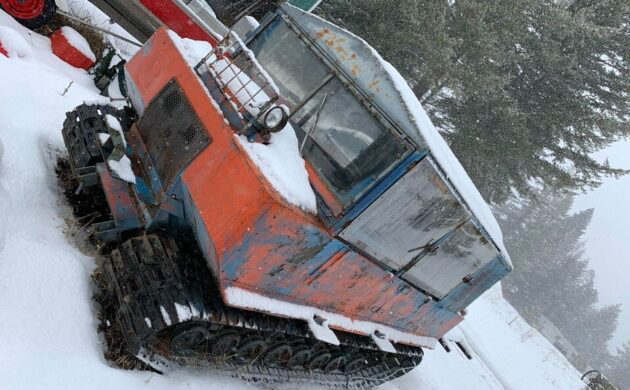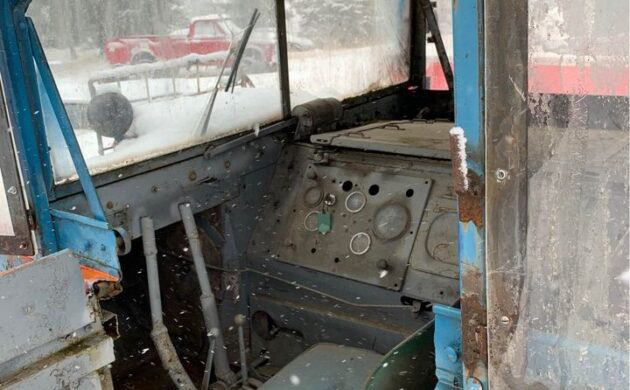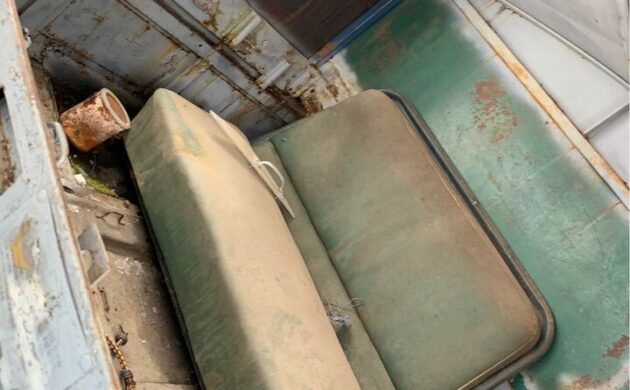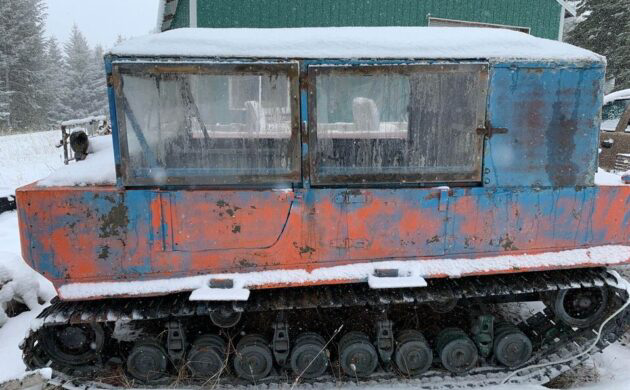As WWII became a certainty, the world shifted to war-time manufacturing. Factories – no matter what their product – were pressed into service making munitions and military vehicles. Studebaker contributed to the effort, making cargo trucks, engines, and the M29 Weasel. (Worth noting is that Studebaker had an illustrious portfolio of military vehicles stretching back to 1857.) The Weasel was conceived by an English inventor, Geoffrey Pyke, who believed it was a good idea to attack Axis facilities in Norway. That endeavor would entail motoring over snow and ice. A tracked vehicle was required – one that could be dropped via air transport. The Weasel hit the ground in 1942, but was never deployed to Norway – that mission was canceled. It found use in other situations, including swampy ground, minefields, as an ambulance, and – its star assignment – landing at Normandy. The Weasel came in several different body styles including the cargo carrier, Water Weasel, and the gun-toting Weasel. Here on facebook Marketplace is a 1942 Studebaker Weasel project for sale, with an asking price of $1500. If you go for it, you’ll be retrieving your Weasel from Weston, Oregon. We have Angel to thank for this tracked tip!
The seller notes that the vehicle is not running (he’s only helping someone else sell the Weasel, so the information in the listing is scant). The original engine was the Studebaker Champion in-line six-cylinder, making about 70 hp. This was enough to propel the lightweight vehicle at about 30 mph. The seller notes that the motor in his Weasel is a four-cylinder. Early Weasels had rear-mounted motors; the later W29’s motor was mounted up front. Steering and throttle are controlled by sticks; there is no brake pedal. Reports from one division – the 87th Chemical Mortar Battalion (Aug 1944) – indicated: All companies are having a great deal of trouble with the M-29 Cargo Carriers on long movements …. The Cargo Carriers have been overheating and, in several cases, the water has completely boiled out of the radiators. These vehicles were made to operate in arctic temperatures. The motor becomes so hot that the oil in the transmission literally boils and boils out. Plates are coming off the tracks and the cables that hold the tracks together break … All in all, the efficiency and mobility of this battalion is greatly reduced by our being required to operate with such a vehicle, not only because it is inefficient but because it was never intended to operate in this climate or on hard and paved roads.
The seating is barren, but tolerable given the age of this vehicle and the likelihood that its storage and treatment weren’t always the best. An idiosyncratic feature of the vehicle was its provision for self-destruction. A carrier held TNT which could be detonated remotely, saving the Weasel from enemy scavengers.
I like the full weather equipment here. We can imagine that, as for many vintage roadsters, weather equipment does not always survive. The track type changed over time and from model to model; rebuilding Weasel tracks is a bit of an obsession for owners as parts are unobtanium. Just be sure to keep your Weasel in the snow or swamp!






As a USAF site commander my dad had some of these in 1955 while stationed north of Thule, Greenland on the DEW (Distant Early Warning) Line, a string of radar sites along the Article Circle across from the USSR. He hated them as for one things they’d throw a track in a heartbeat plus you never got them over 16 MPH before something catastrophic happened.
The first time he saw a snowmobile he yelled “Damn! We’d of given 2 months pay for one of those!!” He knew they were expensive but when I asked him how much that would’ve been he said “nowhere nearly enough for what we were doing but that’s just how the job goes..”
Good thing that likely was an “unaccompanied” tour, or did you get to play in the snow a lot?
I knew a few weasels in high school. They’re in prison now.
Run! Run far away! ASAP!!!
Add says sold I’m not surprised, this thing will make a fun project for people who like to play in the snow, I’m not one of them
These would be a big hit in far north Canada and Alaska
Already sold!
It is not surprising at that price. It might make a good, static display at some museum.
Helped restore one for the 10th Mountain Division in Colorado. A museum of everything skiing, climbing and military use. Was a two seat vehicle, skid steer, canvas top, wood slat tracks. My understanding of these, is they were also used to tow men on skis up hills for combat training in the snow, part of the 10th Mtn Div. They had to drive them in reverse to place the weight of the engine up hill to keep it from standing on end and basically rolling backwards down hill. Have a shirt we’re sold to help raise monies for the restoration. “Save the Weasel”.
Poor man’s Lost in Space chariot?
This type of vehicle played a major role in the clearing of the Scheldt estuary and the reduction of Walchern island.
This was a very important operation because Antwerp could not be used as a port so long as the estuary was in German hands.
The low ground pressure allowed it to cross muddy flooded fields.
I would like to buy this, I have 1 m29 already I live in Alaska but have a yard in grants pass oergon
Randy, we have one fo sale in Colorado if you are interested. Needs to be restored.
Send it in so we can auction it for you!
Thanks for getting back to me Jesse. So you you just need photos and contact info?
Here’s more info: https://barnfinds.com/auctions/about/